"Cats are much like you and me."
I apologize if this book entry inspires singing. Then again, would that be so bad? Do cats and singing go together? Would that be so cacatphonous? Oh, the silliness around here! Apologies.
As I was saying, the rather serious but occasionally silly Thomas Stearns "T. S." Eliot (September 26, 1888 – January 4, 1965) wrote this collection, Old Possum's Book of Practical Cats, feline-inspired nonsensical rhymes for his godchildren in the 1930s. Still, it is meant to be enjoyed by children (and feline aficionados) of all ages. Eliot made it purposefully lyrical and vibrantly theatrical. It was only a matter of time until Sir Andrew Lloyd Webber turned it into Cats the Musical.
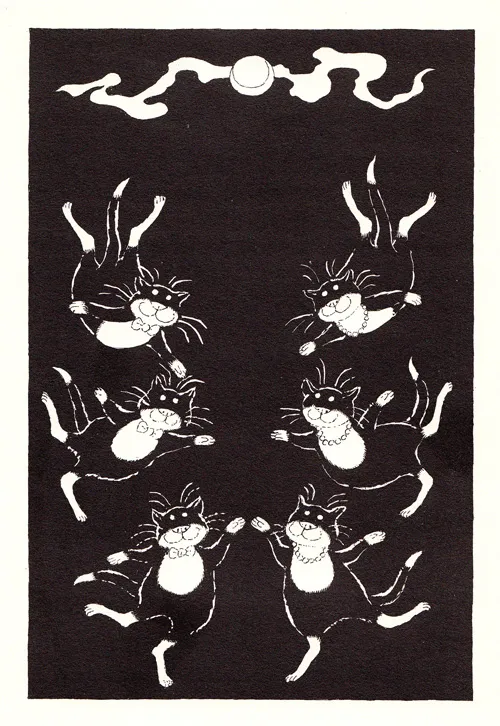 "Jellicle Cats come out to-night / Jellicle Cats come one come all..." Illustration by Edward Gorey.
"Jellicle Cats come out to-night / Jellicle Cats come one come all..." Illustration by Edward Gorey.Jellicle Cats are black and white,
Jellicle Cats are rather small;
Jellicle Cats are merry and bright,
And pleasant to hear when they caterwaul.
Jellicle Cats have cheerful faces,
Jellicle Cats have bright black eyes;
They like to practise their airs and graces
And wait for the Jellicle Moon to rise.
Jellicle Cats develop slowly,
Jellicle Cats are not too big;
Jellicle Cats are roly-poly,
They know how to dance a gavotte and a jig.
Until the Jellicle Moon appears
They make their toilette and take their repose:
Jellicle Cats wash behind their ears,
Jellicle dry between their toes.
Jellicle Cats are white and black,
Jellicle Cats are of moderate size;
Jellicle Cats jump like a jumping-jack,
Jellicle Cats have moonlit eyes.
They're quiet enough in the morning hours,
They're quiet enough in the afternoon,
Reserving their terpsichorean powers
To dance by the light of the Jellicle Moon.
From "The Song of the Jellicles"
Read full poem here.
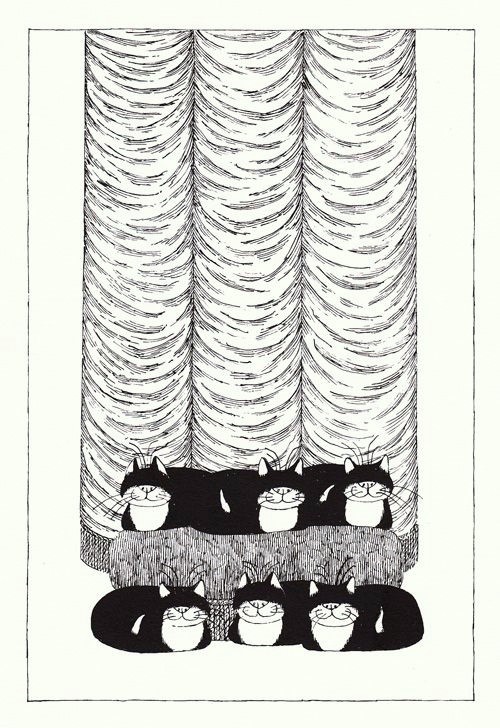 More Jellicle cats. Illustration by Edward Gorey.
More Jellicle cats. Illustration by Edward Gorey.The original 1939 publication of Book of Practical Cats, issued by Faber & Faber, the publishing house for which Eliot edited and advanced the careers of numerous poets, including Marianne Moore and Ted Hughes, contained illustrations by Nicholas Bentley (a popular satirical cartoonist), which were charming, but limited in imagination. Eliot himself drew the original cover.
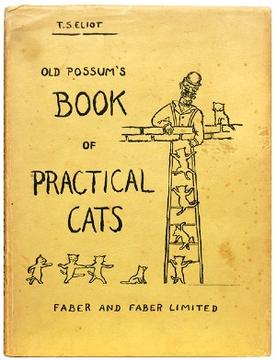 The original 1939 cover for Eliot's Old Possum's Book of Practical Cats.
The original 1939 cover for Eliot's Old Possum's Book of Practical Cats.Fortunately, less than two decades after Eliot's death, Faber & Faber nudged American illustrator Edward Gorey, a cat owner/sufferer himself, to lend his enticing and cheeky visuals to a 1982 reprint. At last, we have a visual and musical memory of Eliot's beloved cats that befits their abounding human-like personality and occasional depravity.
Like Macavity, the Dickensian trickster - naturally a ginger - eludes humans and cats alike.
Macavity’s a Mystery Cat: he’s called the Hidden Paw—
For he’s the master criminal who can defy the Law.
He’s the bafflement of Scotland Yard, the Flying Squad’s despair:
For when they reach the scene of crime—Macavity’s not there!
Macavity, Macavity, there’s no one like Macavity,
He’s broken every human law, he breaks the law of gravity.
His powers of levitation would make a fakir stare,
And when you reach the scene of crime—Macavity’s not there!
You may seek him in the basement, you may look up in the air—
But I tell you once and once again, Macavity’s not there!
Macavity’s a ginger cat, he’s very tall and thin;
You would know him if you saw him, for his eyes are sunken in.
His brow is deeply lined with thought, his head is highly domed;
His coat is dusty from neglect, his whiskers are uncombed.
He sways his head from side to side, with movements like a snake;
And when you think he’s half asleep, he’s always wide awake.
Macavity, Macavity, there’s no one like Macavity,
For he’s a fiend in feline shape, a monster of depravity.
You may meet him in a by-street, you may see him in the square—
But when a crime’s discovered, then Macavity’s not there!
From "Macavity: The Mystery Cat"
Read full poem here.
 "Macavity, Macavity, there's no one like Macavity..."
"Macavity, Macavity, there's no one like Macavity..." Those of us who know and pay attention to cats (which they demand on an hourly basis or else why so many antics?!) often find that they remind us of one another but that they are as distinct as any human. You might recognize a cat you love or have loved among Eliot's practical cats.
Cats are, after all, just like you and me.
Bustopher Jones is not skin and bones—
In fact, he's remarkably fat.
He doesn't haunt pubs—
he has eight or nine clubs
For he's the St. James's Street Cat!
He's the cat we all greet as he walks down the street
In his coat of fastidious black:
No commonplace mousers have such well-cut trousers
Or such an impeccable back.
From "Bustopher Jones: The Cat About Town"
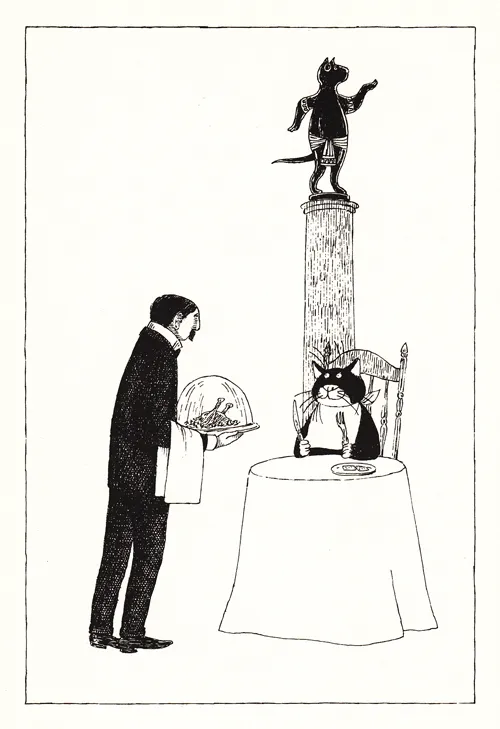 "Bustopher Jones is not skin and bones..." Illustration by Edward Gorey.
"Bustopher Jones is not skin and bones..." Illustration by Edward Gorey.My particular favorite is "The Naming of Cats," in which Eliot shows his hand as a knower of cats, a creature Terry Pratchett lovingly called "more than simply neurotic." Eliot's "Naming of Cats" suggests that cats—rightly—deserve three names to encompass their greatness. There's the daily family name, the particular name that never belongs to more than one cat, and finally, there's the name a cat knows himself and will never confess.
"My name is one of the smallest kernels of who I am," writes author Durga Chew-Bose, who considers her name deeply in Too Much and Not the Mood. Read other thoughts on how naming defines and restricts us in Anna Deavere Smith or Ta-Nehisi Coates.
Naming is deeply complex, personal, and in a way both public and private. Self-identifying, yet bestowed on us.
I love the idea of having a name we reveal to no one else.
The Naming of Cats
The Naming of Cats is a difficult matter,
It isn’t just one of your holiday games;
You may think at first I’m as mad as a hatter
When I tell you, a cat must have THREE DIFFERENT NAMES.
First of all, there’s the name that the family use daily,
Such as Peter, Augustus, Alonzo, or James,
Such as Victor or Jonathan, George or Bill Bailey—
All of them sensible everyday names.
There are fancier names if you think they sound sweeter,
Some for the gentlemen, some for the dames:
Such as Plato, Admetus, Electra, Demeter—
But all of them sensible everyday names,
But I tell you, a cat needs a name that’s particular,
A name that’s peculiar, and more dignified,
Else how can he keep up his tail perpendicular,
Or spread out his whiskers, or cherish his pride?
Of names of this kind, I can give you a quorum,
Such as Munkustrap, Quaxo, or Coricopat,
Such as Bombalurina, or else Jellylorum—
Names that never belong to more than one cat.
But above and beyond there’s still one name left over,
And that is the name that you never will guess;
The name that no human research can discover—
But THE CAT HIMSELF KNOWS, and will never confess.
When you notice a cat in profound meditation,
The reason, I tell you, is always the same:
His mind is engaged in a rapt contemplation
Of the thought, of the thought, of the thought of his name:
His ineffable effable
Effanineffable
Deep and inscrutable singular name.
Who hasn't stared into the depths of cat eyes and wondered what magic lies therein?
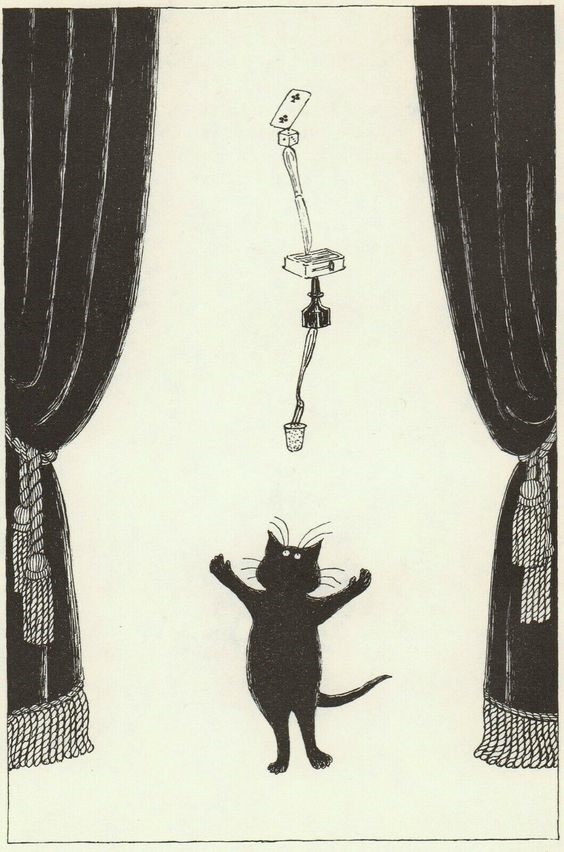 Magical Mr. Mistoffelees. Illustration by Edward Gorey.
Magical Mr. Mistoffelees. Illustration by Edward Gorey.You ought to know Mr. Mistoffelees!
The Original Conjuring Cat—
(There can be no doubt about that).
Please listen to me and don’t scoff. All his
Inventions are off his own bat.
There’s no such Cat in the metropolis;
He holds all the patent monopolies
For performing surprising illusions
And creating eccentric confusions.
At prestidigitation
And at legerdemain
He’ll defy examination
And deceive you again.
From "Mr. Mistoffelees"
Read full poem here.
Eliot's Old Possum's Book of Practical Cats is perched on the edge of poetry and nonsense, drawing from a long British tradition of folding the unhuman into our known humanity. By turning these cats into developed characters, with a dose of nonsense on the side (like their suggested class distinctions - do cats have classes?) Both Eliot and Gorey hinted at the tradition of 19th-century caricaturists like Edward Lear (a cat owner whose nonsense alphabet is a tiny treat) and the ongoing tradition of British humor and its double helix of silliness and seriousness.
The Rum Tum Tugger is a Curious Cat:
If you offer him pheasant he would rather have grouse.
If you put him in a house he would much prefer a flat,
If you put him in a flat then he'd rather have a house.
If you set him on a mouse then he only wants a rat,
If you set him on a rat then he'd rather chase a mouse.
Yes the Rum Tum Tugger is a Curious Cat—
And there isn't any call for me to shout it:
For he will do
As he do do
And there's no doing anything about it!
The Rum Tum Tugger is a terrible bore:
When you let him in, then he wants to be out;
He's always on the wrong side of every door,
And as soon as he's at home, then he'd like to get about.
He likes to lie in the bureau drawer,
But he makes such a fuss if he can't get out.
From "Rum, Tum Tugger"
Read full poem here.
 "The Rum Tum Tugger is a curious cat." illustration by Edward Gorey.
"The Rum Tum Tugger is a curious cat." illustration by Edward Gorey.Anyone who can deliver the shenanigans of Macavity, Mr. Mistoffelees, and the rest of the Jellicles and simultaneously imagine mountains that bring no comfort (as Eliot did in his century-old but astoundingly prescient poem of being and nothingness) gives us insight into human complexity and breadth. How we are both silly and serious, macabre and light. Read Old Possum's Book of Practical Cats in tandem with Eliot's monument to modernity "The Waste Land" and imagine a mind that encompassed both.


